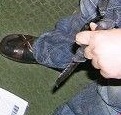Rolling Stone
On May 27th, more than a month into the worst environmental disaster in U.S. history, Barack Obama strode to the podium in the East Room of the White House. For weeks, the administration had been insisting that BP alone was to blame for the catastrophic oil spill in the Gulf – and the ongoing failure to stop the massive leak. "They have the technical expertise to plug the hole," White House spokesman Robert Gibbs had said only six days earlier. "It is their responsibility." The president, Gibbs added, lacked the authority to play anything more than a supervisory role – a curious line of argument from an administration that has reserved the right to assassinate American citizens abroad and has nationalized much of the auto industry. "If BP is not accomplishing the task, can you just federalize it?" a reporter asked. "No," Gibbs replied.
Now, however, the president was suddenly standing up to take command of the cleanup effort. "In case you were wondering who's responsible," Obama told the nation, "I take responsibility." Sounding chastened, he acknowledged that his administration had failed to adequately reform the Minerals Management Service, the scandal-ridden federal agency that for years had essentially allowed the oil industry to self-regulate. "There wasn't sufficient urgency," the president said. "Absolutely I take responsibility for that." He also admitted that he had been too credulous of the oil giants: "I was wrong in my belief that the oil companies had their act together when it came to worst-case scenarios." He unveiled a presidential commission to investigate the disaster, discussed the resignation of the head of MMS, and extended a moratorium on new deepwater drilling. "The buck," he reiterated the next day on the sullied Louisiana coastline, "stops with me."[...]
On May 27th, more than a month into the worst environmental disaster in U.S. history, Barack Obama strode to the podium in the East Room of the White House. For weeks, the administration had been insisting that BP alone was to blame for the catastrophic oil spill in the Gulf – and the ongoing failure to stop the massive leak. "They have the technical expertise to plug the hole," White House spokesman Robert Gibbs had said only six days earlier. "It is their responsibility." The president, Gibbs added, lacked the authority to play anything more than a supervisory role – a curious line of argument from an administration that has reserved the right to assassinate American citizens abroad and has nationalized much of the auto industry. "If BP is not accomplishing the task, can you just federalize it?" a reporter asked. "No," Gibbs replied.
Now, however, the president was suddenly standing up to take command of the cleanup effort. "In case you were wondering who's responsible," Obama told the nation, "I take responsibility." Sounding chastened, he acknowledged that his administration had failed to adequately reform the Minerals Management Service, the scandal-ridden federal agency that for years had essentially allowed the oil industry to self-regulate. "There wasn't sufficient urgency," the president said. "Absolutely I take responsibility for that." He also admitted that he had been too credulous of the oil giants: "I was wrong in my belief that the oil companies had their act together when it came to worst-case scenarios." He unveiled a presidential commission to investigate the disaster, discussed the resignation of the head of MMS, and extended a moratorium on new deepwater drilling. "The buck," he reiterated the next day on the sullied Louisiana coastline, "stops with me."[...]



